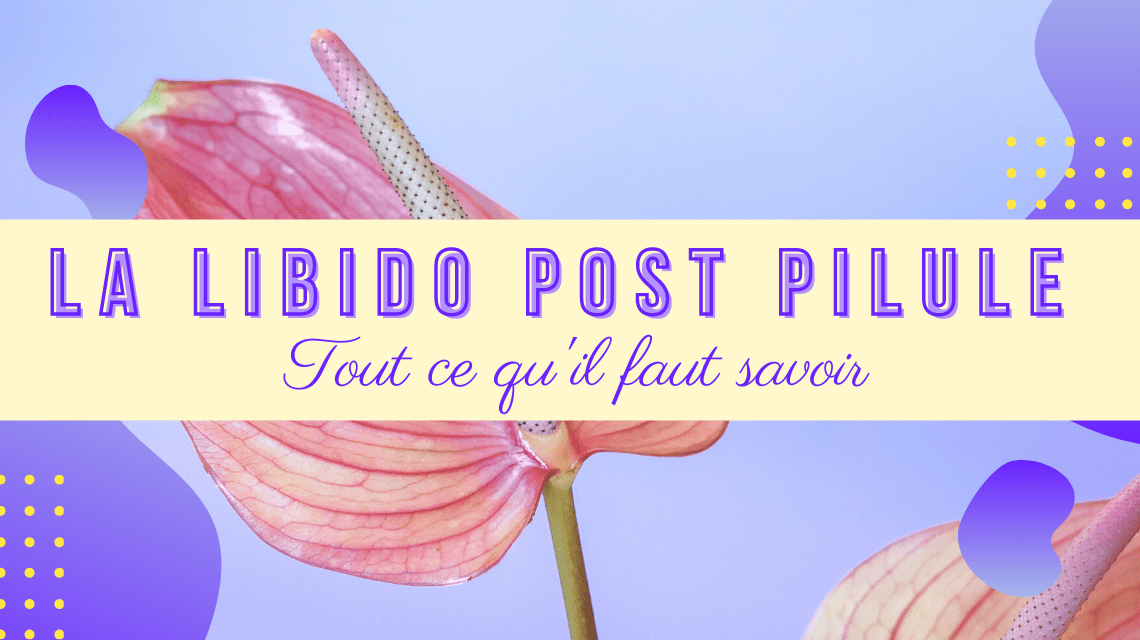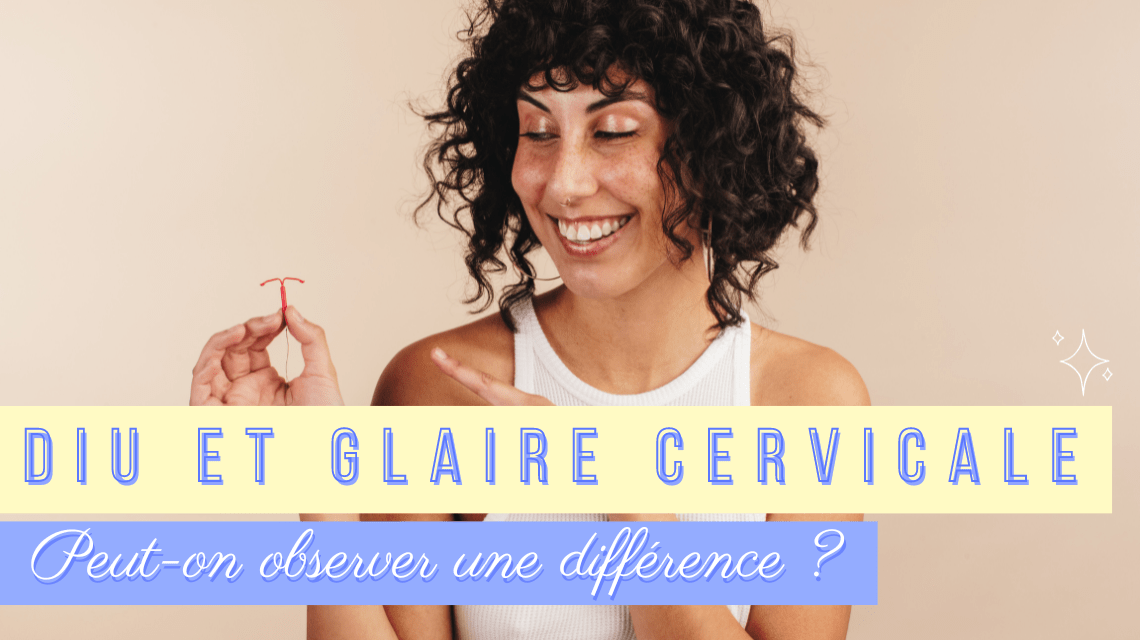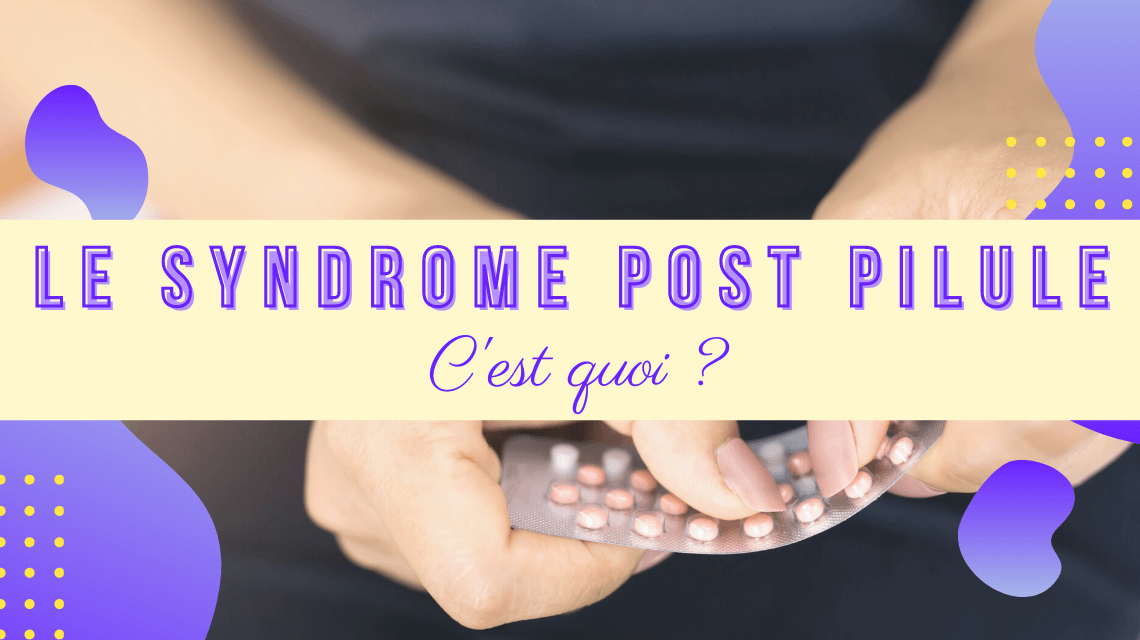When we ask some women who have stopped taking the pill what positive effects they have noticed, many of them cite the return of their libido. And yet... if we're making an article about it, it's certainly because the answer isn't so simple: stopping the pill = return of libido.
In fact, some women do not notice a return of libido after taking the pill. This often generates a lot of frustration, as it's sometimes a point on which there are a lot of expectations.
We're dedicating an article to this topic, as the subject of libido afterstopping the pill is a sensitive one for many people today. Even to the point of causing discomfort in some couples. It's also a source of suffering for some women, who may feel "helpless" or even "abnormal".
To make it easier to understand the rest of this article, and to avoid long sentences. The term "sexual intercourse" includes both penetrative and/or non-penetrative sexual intercourse and :
- that they are shared alone (thus associated with masturbation);
- or shared with one or more people.
What you need to know about libido

The mechanisms of desire, with and without the pill
Why do I have no libido on the pill?
Libido: a link with testosterone levels?
On the pill, testosterone levels are relatively low. In fact, some pills, particularly the so-called "anti-acne" pills (Diane 35, Jasmine, Jasminelle...) considerably lower testosterone levels. For a simple reason: it's also what enables them to have an impact on acne, by reducing sebum production. Less testosterone = less sebum production too.
Note that not all pills lower testosterone levels to the same extent as so-called "anti-acne" pills. This may also explain some of the differences between the pills.
Reduced vaginal lubrication
Another interesting point to note is that taking the pill tends to make vaginal lubrication less important. In fact, the production of cervical mucus, which usually varies throughout the cycle, is normally of particular interest for vaginal lubrication. This also helps to make intercourse more enjoyable. The link with libido here is more subtle. But: poorer vaginal lubrication = less pleasurable intercourse = less intense pleasure > potential reluctance to have sex > impact on libido. All these little points are worth considering.
"Lack of libido is in your head".
Who hasn't heard this phrase when talking about the pill with a gynecologist? However, in reality, if we go back to the points raised above, the lack of libido on the pill can still be explained to a certain extent. But instead, you'll usually be told that it's all in your head, that maybe you should think about changing partners, or that... so what?
So, if the above points are to be believed, stopping the pill is bound to mean the return of libido, isn't it?
Return of libido after the pill
Expectations: return of libido after stopping the pill
When you stop taking the pill, you expect your libido to skyrocket. Thanks to the return of testosterone to a more adequate level and a return to cervical mucus production.
Like the rest of our sex hormones, testosterone levels vary during the menstrual cycle. It peaks around ovulation: the reproductive instinct! That said, an increased sexual desire can also be observed during the menstrual period.
The same applies to cervical mucus. Its texture varies throughout the cycle, becoming stringy/slippery around the time of ovulation, which may also be linked to sexual desire at this time of the cycle. But that's not the only factor, because during the menstrual period, cervical mucus generally doesn't have the same texture, and this doesn't prevent you from having a stronger sexual desire.
All in all, these let's say theoretical indicators may lead us to believe that the libido goes back up when you stop taking the pill, and then that's the end of the story.
Reality: I have no post-pill libido
Beyond this highly theoretical observation, the reality is always more nuanced. Indeed, when they stop taking the pill, many women are faced with a reality... their libido doesn't seem to be any more present. Worse still, it is even less present than on the pill.
For the people we've already had the opportunity to talk to, the words used are often very strong, and heavy with self-reproach.
- destitute
- not "normal
- frustrated
- "lack of self-confidence"
- guilt
Libido: a plural subject
When we talk about libido, we just seem to be talking about sexual desire. In fact, the definition in L'Internaute bears witness to this.
Libido, feminine noun: instinct, sexual desire. In a very biological, almost animal sense, linked to reproduction.
When, in fact, it's a subject that leads to many others. Libido can hardly be considered in a purely "biological" sense.
Psychological point of view (society, relationship with oneself...)
Expectations of standardized sexuality
The paradox with sexuality is that it's supposed to be fulfilling and it's supposed to flow. But at the same time, it's important not to talk too much about it, and to be discreet about it. Okay, we're exaggerating here, but that's about it.
There's a kind of "good conduct manual" for sexuality: frequency of intercourse, frequency of masturbation, right or wrong way of doing things... Which constantly adds a form of pressure or a propensity for comparison.
And although it may seem a long way off, it's actually quite close. Often, in a couple, if the libido becomes a little too absent, guilt arrives. We count the days between reports to reassure ourselves, or on the contrary, to alarm ourselves. And we often feel guilty, telling ourselves that "the other", i.e. our partner, will think there's not enough. Because we're surrounded by norms that seem to unconsciously dictate how our sex life should unfold.
But the first question to really ask yourself is... How does MY libido affect ME?
Self-relationship, self-esteem
Yes, because when you're in a relationship, it's easy to turn your attention back to your partner.
- What must he think of all this?
- What does he want from me?
- Is he reproaching me outright, or just implying it?
- Does he really have a problem with it, or doesn't he care?
In short, we usually worry a lot about our partner and what he might think. All the more so as it's not always easy to get to the bottom of the problem and create a genuine exchange of views on the subject.
When in reality, the first question would be: what do I think of this sexual desire that I consider, at this period of my life, at this given moment, as not necessarily very present?
Does it make ME sad?
Does it make ME uncomfortable?
Am I missing it deeply, or am I conditioning myself to miss it in relation to this "sexual norm"?
And that often leads to... mental space andself-esteem. We'll talk more about this below in this article on solutions to increase your libido.
Health point of view (hormonal imbalance...)
When the pill is stopped, the body experiences a hormonal imbalance, before things eventually stabilize. During this period, libido may be affected (but this is not necessarily the case).
As a result, some women notice a markedly higher libido as soon as they stop taking the pill. For others, it's much more nuanced, or even the libido seems to exist.
Why? Hormonal imbalance can have a negative impact on sexual desire. It's not necessarily a pure lack of testosterone, but it could be linked to the global upheaval. When one or other of our hormones is out of balance, it can have a global impact on the body.
On the other hand, if stopping the pill in itself is a source of stress and doubt, and you have a lot of questions. This can lead to a form of latent stress, which in turn is certainly not conducive to sexual desire. As if you just didn't have "the mental space to worry about it." Which brings us back to the previous point.
Libido by cycle
I have more libidos during ovulation
The phases of the menstrual cycle can also have a clear impact on libido. And for good reason: from a strictly biological point of view, we are reproductive beings. The fertile phase is also when testosterone levels technically peak. This is why the ovulatory phase can be accompanied by a marked sexual desire (to a greater or lesser extent depending on the woman, the period of her life, etc.).
I have more libidos during my period
For some people, libido may be highest during the menstrual phase (or just before, or just after). This could be explained, among other things, by the fact that testosterone remains the "highest" hormone at this time of the cycle. While all others fall drastically (triggering menstruation).
There's also a more psychological aspect, namely that this phase of the cycle is generally associated (consciously or unconsciously) with a phase when it's not possible to get pregnant. This could have an impact on sexual desire, as intercourse at this time would be psychologically associated with less risk of pregnancy. This is all supposition.
In short, it's perfectly normal for your libido to fluctuate with your menstrual cycle. Some people have shared with us the fact that this has caused them a few problems in their relationship. Because the male partner, not experiencing the same fluctuations, found it hard to understand. In this case, we refer you to the "How to talk about it with your partner" section below.
How can I increase my libido? What are the solutions?

Seek overall balance of the body for hormonal balance and boost libido
Restoringoverall hormonal balance will be one of the key points when stopping the pill. As much for libido as for everything else in general. The body may need time to regain a certain stability.
This can take several months and is also normal. The transition cannot be made in just a few weeks.
The idea is also to make the different phases of the cycle clearer and more distinct. The more they are marked, and therefore stabilized, the better the sensations associated with these phases can be felt. For example: the rise in testosterone during the ovulatory phase can lead to a higher libido.
How do I know if I have a hormonal imbalance?
Signals that the hormonal balance has not yet been restored:
- very irregular ovulation
- rather short luteal phase (second phase of the cycle): less than 8 days
- heavy periods
- Severe PMS (both physical and psycho-emotional)
Time can do its part to restore balance to the cycle. Nevertheless, we still advise you to make certain lifestyle adjustments to facilitate the return to a calmer cycle. It can also prevent certain imbalances from becoming more serious. Here are our resources to help you get back on track:
Herbs to boost libido?
We've certainly all heard of ginger as an aphrodisiac... But hey, in real life, and beyond the rumors, can we really count on it? 😂
Certain plants are reputed (on the Internet) to boost libido: maca, ginger, schisandra. However, you shouldn't assume that supplementing with these plants will really have an impact on your libido.
So what should we be looking at?
This is not to say that these plants are of no interest. On the contrary, maca, for example, is a plant of Peruvian origin that is highly nutritious and very interesting for supporting the body. A bit like a crutch to support the body in more difficult times. However, there are several parameters to consider.
- The quality of the plant (in this case, maca is consumed in powder form, as it resembles a tuber)
- Dosage: what we often forget to say is that to benefit from the properties of plants as they are promoted in their country of origin, we need to consume them as they are in the country of origin. Namely: in large quantities (for maca in this case). Which is quite expensive in practice. Little capsules sold on the internet or in organic stores don't amount to much. Basically, most labs and brands are going to use the properties of these plants for marketing purposes, but in reality this is absolutely no match for their traditional use.
- Origin: using a plant that comes from very far away, and in dosages that would be really interesting, is a form of disaster for the wallet and the environment. Perhaps even on a social and human level. The more popular a product is, the more likely it is to be accompanied by major inequalities (between operators, suppliers and buyers).
Using plants to boost libido: is it really useful?
Clearly, as you'll have gathered, we're not here to promote this kind of plant use, for one simple reason... Before relying on plants, there are already a HUGE number of parameters we can try to work on.
Some more local plants, such as nettle, can also be interesting as a support. Nettle works in a similar way to adaptogenic plants (which are generally Asian plants).
As nettle is a highly nutritious, remineralizing plant, its use may be appropriate for certain people in times of stress, hormonal imbalance or weakened resources. You can buy it at Nutripure.
When it comes to using a partly herbal protocol, you can turn to a professional to draw up an action plan that's right for you.
Psycho-emotional self-development (self-esteem, self-confidence)
Between libido and mental load
Here's a small, non-exhaustive sample of questions that can help you see how the notion of libido is inherent in many other elements:
- Do I feel like I'm carrying a heavy mental load?
- Am I feeling overwhelmed/tired right now?
- Do I have enough mental space right now?
- Do I feel fulfilled in my work?
- When I'm off work, do I take time for myself or am I just consumed by everyday tasks (housework, meals, shopping...)?
- Would having sex right now be like having to check one more box on an already full to-do list?
- How do I feel in my body?
- Do I think I'm "not enough"?
- Is the way I view my body fueled a lot by blame, judgment, comparison?
It's always a paradox in a life where you have to be everywhere: active and fulfilled in your work, cultivating rich relationships, paying attention to your ecological impact, being careful about what you consume... In short, the list can be endless and the mental burden is becoming increasingly heavy.
All these elements accumulate and sometimes lead us to move further away from ourselves, rather than closer. By spreading ourselves too thinly, we forget what's essential: what really makes us feel good and what we really need. From a very simple point of view. And doing the work of going back to basics to cherish what's essential and respect what makes us feel good is a very gradual process. The aim is not to add to the mental burden with an additional injunction.
Here are a few tips to help you go further:
Here are a few ideas to help you get started at your own pace, if and when you want:
General self-development
- Esther Taillifet's Se Sentir Bien podcast
- The Community: a space for self-development by subscription (by Esther Taillifet)
Self-development, sex part :
Cycle monitoring: a self-confidence boost
Our favorite playground iscycle observation. Cycle monitoring is a real confidence-booster. And in terms of libido after stopping the pill (or not), this can also have a significant impact.
Cycle observation means knowing which phase of your cycle you're in, by knowing how to analyze the clues your body sends you. As the cycle progresses, certain signals appear and/or can be observed: temperature, cervical mucus, feelings/emotions. All these elements are real nuggets to help you understand where you are in your cycle.
Beyond the "first degree" aspect of observation, it also helps you learn to see your body differently. It's awe-inspiring to see what can happen during the menstrual cycle. Nothing is done at random, and the signals your body sends you are powerful. These are real keys to getting to know you better.
The better you know yourself, the more confidence you'll have in yourself and your body. The more you learn to look at it with love and kindness, the more you can nurture that notion of sexual desire.
First you cultivate this sexual desire for yourself, then you can choose to share it.
It's also related to the notion of loving oneself in order to be able to love at all. Make time for yourself, give yourself importance. To find out more about cycle tracking, discover how to integrate cycle tracking.
How to broach the subject with your partner
As we've already mentioned, talking about libido sometimes means broaching the thorny subject of libido within a couple's relationship. For many people, behind this subject lies an emotion controlled by fear and frustration. Fear of what the other person might think, of what the other person might need. Sometimes it's just a matter of guesswork, as the subject is not clearly addressed in the relationship. On the other hand, sometimes they are open reproaches, in which case we refer you to the last part of this article, "Respect".
Professional guidance
Before taking stock of the situation with your partner, there may already be the notion of accepting to take stock of the situation with yourself. The aim is not necessarily to blame or "transfer" guilt. All in all, this could lead to even more misunderstanding and a rather closed discussion.
If talking about sexuality is something that makes you uncomfortable, why not try turning to a professional. A sex therapist, psychologist or coach, so that you can broach the subject in a more detached way than if you were doing it in front of your partner. If you feel that discussing this subject isn't complicated for you but you just don't know how to approach things. The help of a practitioner can also prove beneficial.
These professionals are specially trained to support you in this area, guiding you step by step.
Making the subject less formal: using play
To approach the subject in a less formal way than "Well, we need to talk", why not use a game? This can bring a different perspective to the subject of sexuality.
In particular, there's the spicy "Ça reste entre nous" game (sex version). The basic concept of this game is to deepen relationships. Discover their Instagram account.
"The "Pimenté" extension creates a setting conducive to confidence. We are often hesitant to ask questions that can significantly improve our intimate relationships. intimate relationships . This extension takes a humorous look at these topics and lets you discover your playmate's carnal desires while sharing your own. This non-judgmental game will help you strengthen the bonds you already share. So get naked!"
Just between us
Respect and consent are not options
Finally, always remember that respect and consent are not options. Sexuality, if it becomes a subject of tension and arguments, must not call into question who you are. You're not the problem, you don't have to carry the load and/or the frustration of the other person on this subject.
Besides, you don't have to force yourself, you don't have to "please", you don't have to convince yourself "yes this time", you don't owe anything to anyone. The notion of consent, if you feel it's being called into question: it's your whole relationship that's being called into question.
Finally, and to conclude this article, what we can invite you to do is to put all this information into perspective in relation to your situation and your needs. Libido, like many things in our lives, is not meant to be linear. Even if, like many things, we'd like it to be. One of the first big steps is certainly to make peace with this impermanence before choosing how we want to act and what things we want to put in place to evolve on this point.






